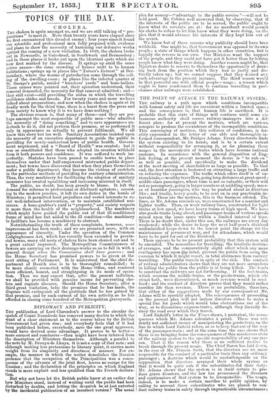DIPLOMACY AND PUBLICITY.
THE publication of Lord Clarendon's answer to the circular de- spatch of Count Nesselrode has removed many. doubts to which the want of a clear statement as to the course taken by the British Government had given rise ; and everybody feels that if it had been published before, everybody, save the one great aggressor, would have derived some advantage. It proves to be better— more earnest and conclusive—than might have been inferred from the description of Ministers themselves. Although a parallel to the note by M. Drouyn de Lhuys, it is not a copy of that note; and although making less pretensions to literary point, it carries more weight from its simplicity and directness of manner. For ex- ample, the manner in which the writer demolishes the Russian pretence that the occupation of the Principalities was a conse- quence of the advance of the joint Beet, leaves no escape for the Russian ; and the declaration of the principles on which England stands is more explicit and less qualified than the French. declara- tion.
But why not have let the British public know at an earlier day how Ministers stood, instead of waiting until the public had been disturbed by doubts, and letting the despatch be at last extorted by the incidental publication of an incorrect version ? The usual
plea for secrecy—" advantage to the public service "—will not be held good. Mr. Cobden well answered that, by observing, that if the interests of the public are to be served, the public ought to know what its servants are at : for no merchant would permit his clerks to refuse to let him know what they were doing, on the plea that it would advance his interests if they kept him out of the secret.
We know but of three reasons why publicity should have been withheld. One might be, that Government was opposed to its own people ; a state of things which happens in other countries, but is happily the reverse in our own. Our Ministers want the support of the people, and they could not have got it better than by letting people know what they were doing. Another reason might be, that Ministers desire to reserve to themselves the opportunity of draw- ing back from the position which they had so justly and dis- tinctly taken up ; but we cannot suppose that they desired any such advantage in the present instance. The third reason would be that powerful one with official people—usage ; a reason which ought to have condemned them to continue travelling in post- chaises after railways were established.


























 Previous page
Previous page